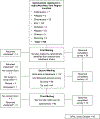Findings from Optometrists' Practices in Advising about Lifestyle Study
- PMID: 32833404
- PMCID: PMC9611529
- DOI: 10.1097/OPX.0000000000001555
Findings from Optometrists' Practices in Advising about Lifestyle Study
Abstract
Significance: Lifestyle influences eye health and other chronic diseases. All health care providers, not just primary care physicians, should have the necessary information and training to advise and refer patients on lifestyle to take advantage of opportunities to provide such advice.
Purpose: The extent to which optometrists offer lifestyle advice to their patients is largely unknown. The Optometrists' Practices in Advising about Lifestyle (OPAL) study aimed to examine lifestyle advice that optometrists offer, to whom such advice is offered, and reasons for not offering this advice.
Methods: We developed and administered a mail-in survey to 140 optometrists in Western New York.
Results: Five surveys were returned because of death, retirement, and relocation. Of the 135 remaining eligible participants, 46 of the optometrists contacted responded to our survey; however, only 42 (31%) provided signed consent forms. Of these, more than 93% report offering advice on smoking, dietary supplements, and diet, and >59% reported offering on physical activity and alcohol use. Eighty-three percent offer advice to only those with unhealthy behaviors or certain conditions. Most advice consisted of mentioning the lifestyle factor's influence on eye or overall health. Reasons for not offering advice included lack of knowledge or training or the belief that advice would not change behaviors.
Conclusions: Optometrists reported offering advice primarily to those with unhealthy lifestyle behaviors or pre-existing health conditions. Future studies should address low response rates, include nonphysician health care providers in addition to optometrists, and also examine patients' perceptions and understanding of the advice offered to better understand whether this advice is received as the provider envisioned.
Figures
Similar articles
-
Seeing New Opportunities to Help Smokers Quit: A UK National Survey of Optometrist-Delivered Smoking Cessation Behavioral Support Interventions.Nicotine Tob Res. 2019 Apr 17;21(5):655-662. doi: 10.1093/ntr/nty066. Nicotine Tob Res. 2019. PMID: 29660046
-
What do patients think about the role of optometrists in providing advice about smoking and nutrition?Ophthalmic Physiol Opt. 2017 Mar;37(2):202-211. doi: 10.1111/opo.12353. Ophthalmic Physiol Opt. 2017. PMID: 28211179
-
U.S. Optometrists' Reported Practices and Perceived Barriers for Low Vision Care for Mild Visual Loss.Optom Vis Sci. 2020 Jan;97(1):45-51. doi: 10.1097/OPX.0000000000001468. Optom Vis Sci. 2020. PMID: 31895277
-
A survey of UK optometry trainees' smoking cessation training.Ophthalmic Physiol Opt. 2016 Jul;36(4):494-502. doi: 10.1111/opo.12290. Epub 2016 Feb 26. Ophthalmic Physiol Opt. 2016. PMID: 26920077
-
The self-reported clinical practice behaviors of Australian optometrists as related to smoking, diet and nutritional supplementation.PLoS One. 2015 Apr 17;10(4):e0124533. doi: 10.1371/journal.pone.0124533. eCollection 2015. PLoS One. 2015. PMID: 25886641 Free PMC article.
Cited by
-
Exploring eye health professionals' knowledge, attitudes and practices towards eye health promotion interventions: a cross-sectional study.Front Public Health. 2025 Jul 24;13:1626792. doi: 10.3389/fpubh.2025.1626792. eCollection 2025. Front Public Health. 2025. PMID: 40777643 Free PMC article.
-
What Advice Is Currently Given to Patients with Age-Related Macular Degeneration (AMD) by Eyecare Practitioners, and How Effective Is It at Bringing about a Change in Lifestyle? A Systematic Review.Nutrients. 2022 Nov 3;14(21):4652. doi: 10.3390/nu14214652. Nutrients. 2022. PMID: 36364912 Free PMC article.
References
-
- Mares JA, Millen AE, Meyers K. Diet and Supplements and the prevention and treatment of eye diseases. In: Coulston AM, Boushey CJ, Ferruzzi MG, eds. Nutrition in the Prevention and Treatment of Disease, 3rd ed. New York: Elsevier/Academic; 2013:341–71.
-
- Solberg Y, Rosner M, Belkin M. The Association between Cigarette Smoking and Ocular Diseases. Surv Ophthalmol 1998;42:535–47. - PubMed
-
- Department of Health and Human Services, Centers for Disease Control and Prevention, National Center for Chronic Disease Prevention and Health Promotion, Office on Smoking and Health. The Health Consequences of Smoking: A Report of the Surgeon General; 2004. Available at: https://www.cdc.gov/tobacco/data_statistics/sgr/2004/complete_report/ind.... Accessed July 2, 2020. - PubMed
Publication types
MeSH terms
Grants and funding
LinkOut - more resources
Full Text Sources
Medical



